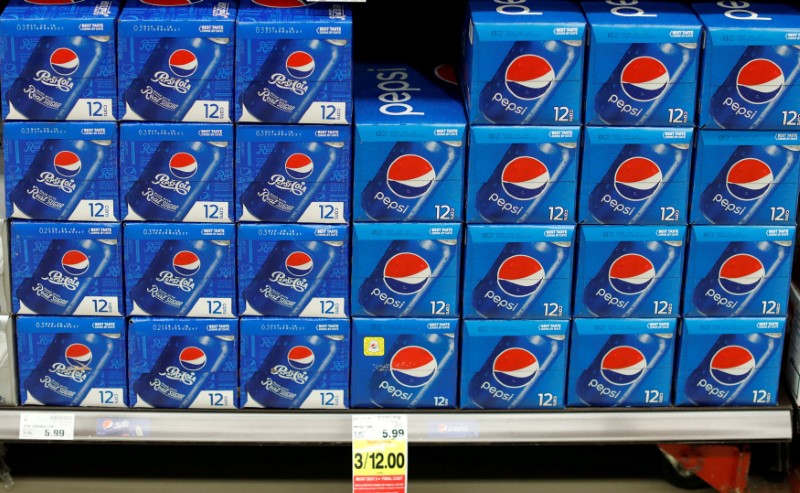By Pratima Desai
LONDON (Reuters) - North American aluminum recyclers and producers are using import tariffs to boost revenue at the expense of local beer and beverage firms, even though most of the metal used in their cans is not subject to the levy, industry data seen by Reuters show.
Recyclers such as Novelis, a subsidiary of India's Hindalco (NS:HALC), and Japanese-owned Tri-Arrows (T:5741) (T:8053) (T:8001), are charging a duty paid price for aluminum, which at the end of January was more than $180 a tonne above the duty unpaid price, according to data from S&P Global Platts.
Meanwhile, data from consultants Harbor Aluminum shows about 70% of aluminum in the cans used by U.S. drinks firms is recycled locally and free from import taxes, while another 16% comes from domestic and Canadian smelters, which are also exempt from the tariffs.
Harbor also estimates drinks firms paid $582 million more for approximately 3 million tonnes of metal they consumed between March 2018 and December 2019 than they would have if there were no tariffs.
Some $81 million of that went to the U.S. government, while the lion's share of $428 million went to recyclers, which also typically produce the aluminum sheet that companies such as Ball (N:BLL) and Crown (N:CCK) turn into cans.
Aluminum accounts for about 65% of the total costs for U.S. drinks firms.
"Over the last 24 months it has cost both Wis-Pak and its shareholders more than $6 million in increased costs," said David Bauer, President of Wis-Pak, a cooperative of family-owned independent Pepsi franchise bottlers.
GLOBAL BENCHMARK
Prices of aluminum in the United States are based on a global benchmark, which is a contract on the London Metal Exchange (LME). Consumers pay the LME price plus the benchmark duty paid Midwest premium, assessed by S&P Global Platts and based on bids, offers and traded prices gathered from traders, consumers and producers. The premium typically covers transport and handling costs and, since March 2018, a 10% tariff on imports of aluminum imposed by the administration of President Donald Trump.
S&P Global Platts also provides an implied duty unpaid premium, which recycling firms, UK-listed Rio Tinto (L:RIO) (AX:RIO) and U.S-listed Alcoa (N:AA) with smelting facilities in Canada are declining to use.
Local producers such as Century Aluminum (O:CENX), in which London-listed miner Glencore (L:GLEN) has a 40% stake, are also declining to use the duty unpaid price.
The duty unpaid premium since S&P Global Platts started to publish it in August 2018 has on average been around $190 a tonne below the duty paid premium, more than 10% of the LME aluminum price currently near $1,600 a tonne.
"There's no premium for the corn and sugar we buy locally to sweeten our products, so why should there be one for aluminum?" said Kelly Clay, chief executive of Admiral Beverage, the fifth-largest Pepsi bottler in the United States.
Producers in Canada earned $29 million by charging for tariffs they did not pay between March 2018 and July 2019, while local smelters saw a revenue boost of $44 million, according to Harbor's estimates.
Alcoa, Century Aluminum, Tri-Arrows, Ball and Crown did not respond to requests for comment, while Rio and Novelis referred Reuters to the Aluminum Association.
"We are genuinely bewildered by recent attempts to pressure aluminum suppliers to change the pricing methodology that has evolved through market forces ... for more than 25 years," said the Aluminum Association's Lauren Wilkes.
U.S. aluminum consumption, mostly in the transport and packaging industries, is estimated to have totaled more than 10 million tonnes last year, about 15% of global demand.
WINDFALL PROFIT
Drinks firms say import levies have changed the environment.
"We met with all our suppliers and asked to pay duty that is reflective of where the aluminum comes from, but we got nowhere," Pete Coors, Vice Chairman of Molson Coors, said.
"These firms have monopolistic control to exploit aluminum tariffs and create windfall profit at the expense of end users by raising their prices to match tariff prices."
Drinks makers want the U.S. system to be reformed so that aluminum producers and recyclers cannot include the cost of tariffs in their prices unless they actually pay them.
But recyclers and producers have declined to do this.
"Unfortunately, we've been left with no other alternative but to request a federal investigation into U.S. aluminum," said Admiral Beverage's Kelly.
S&P Global's head of pricing Dave Ernsberger said in response: "Platts publishes every data point including bids, offers and trades that underlie our assessments for all the market to see and comment on ... our benchmark methodology is transparent."
To facilitate an investigation, the Aluminum Pricing Examination Act (APEX) sponsored in Congress by Democrat Al Lawson and Republican Ken Buck and in Senate by Republican Cory Gardner and Democrat Tammy Baldwin was introduced last year.
The APEX act would give the Commodity Futures Trading Commission oversight over the benchmark premium.
Former CFTC Chair Christopher Giancarlo said at a hearing last year that users were concerned, but "not from the point of view of manipulation", but whether the construction of the Midwest premium was accurate.
Ernsberger said in January "the CFTC already has the authority to oversee the aluminum market and investigate manipulation" and that "the APEX Act is misguided legislation".
He added that the beer industry "has failed for over 18 months to provide any evidence of wrongdoing".

The Aluminum Association's Wilkes said: "The association is happy to cooperate with any fair and independent government oversight of the industry."
